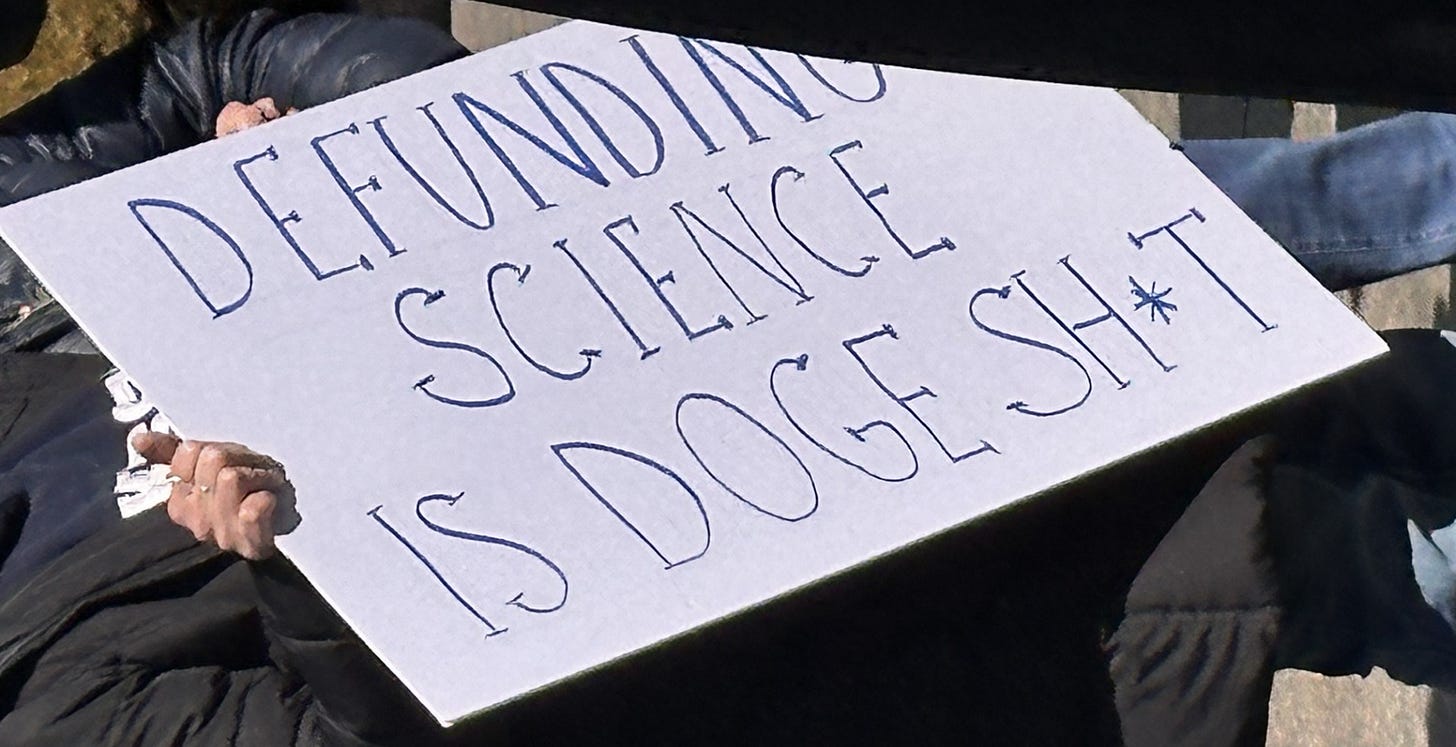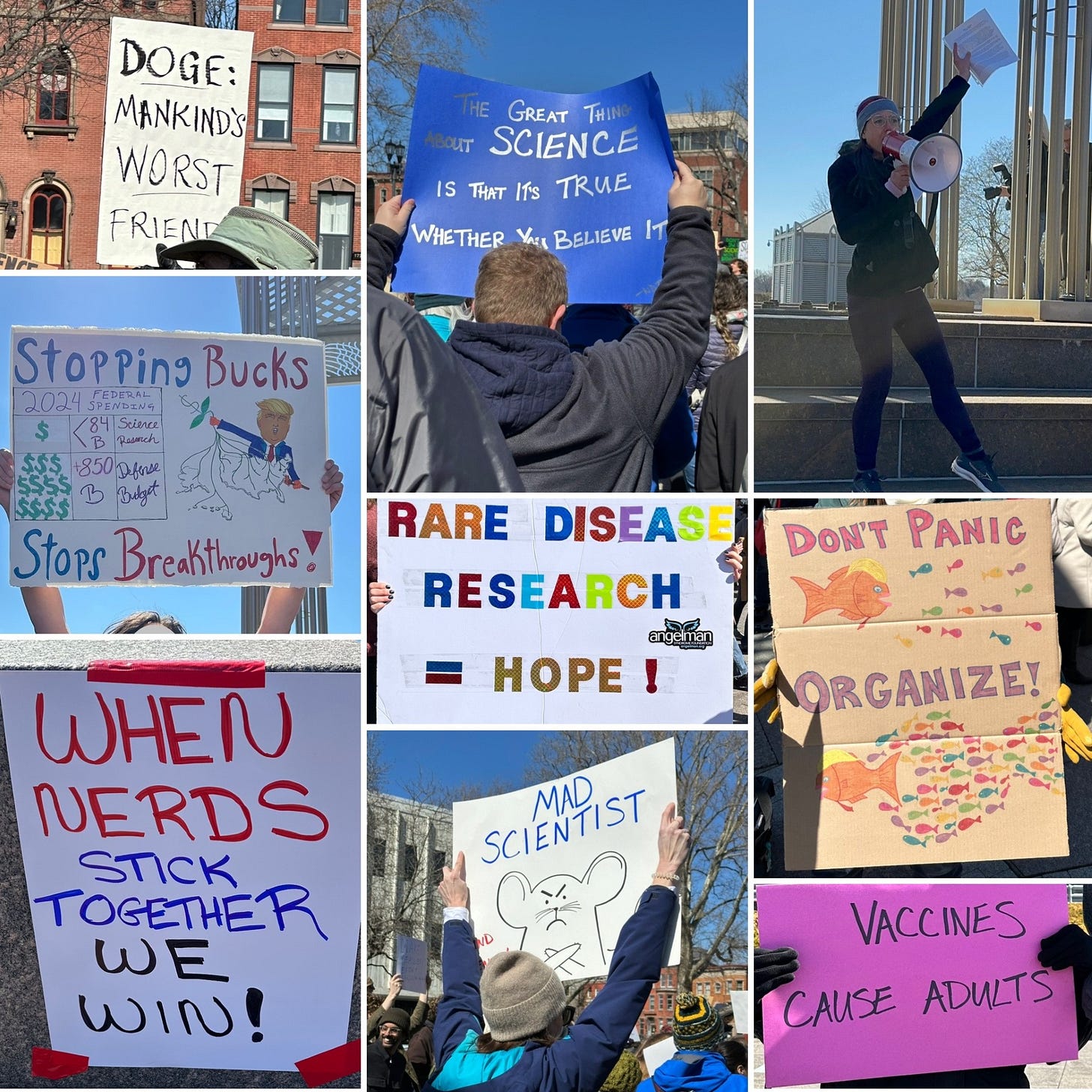Scientists get involved, one local rally at a time
Next step: offer your local paper an interview
In this moment, elected officials, journalists, universities, and businesses are failing through inaction. Complying with authoritarian demands does not help: Columbia University's attempt at appeasement got them nowhere. It is up to individuals to give all of these institutions a good hard push.
Yesterday came a step for mobilization from an unusual sector - supporters of science. On Friday, over 100 Stand Up For Science rallies took place all over the nation. The main event was in Washington, D.C. and attracted thousands; much praise for all who went! Scientists and their supporters are not used to aggressive advocacy. But many saw that taking one Friday away from the lab now might be necessary to have a lab at all one year from now.
Here in Trenton, over 500 people showed up. With nearby events in Philadelphia and New York, it was amazing to see so many show up on a cold, windy day. It seems probable that nationwide, close to 50,000 people turned out (nerds, please usse comments for your approach to estimating this number).
Scientists are used to reading PDFs and watching presentations with slides. It was amazing to see to see them in an outdoor setting, with bullhorns, chants, and eye contact. When scientists are this mobilized, something is brewing.
Using science for effective advocacy
Speaking last, I explained how we can use neuroscience and math to be effective advocates. We are visual, social primates, which means in-person contact and strong visuals (for instance in the media) are best. Whatever you do - postcards, petitions, phone calls - the ideal endpoint for citizens is to get a face-to-face interaction. Watch my remarks here or read them here.
To convert this knowledge to practical action, the organizers want people to call, visit, and petition state and federal legislators, as well as your professional society or University department. For your messaging about NIH, see this U. Penn. White Paper and slides. Drug development, cancer treatments, and basic knowledge are powered by federal support. And science funding produces jobs.
There’s one more thing you can do: offer an interview to your local paper. Many journalists have come to believe that protests are not news - but when scientists do it, it is in fact something new.
How much social mobilization is required?
Researchers Erica Chenoweth and Maria A. Stephan have observed that successful mass protest movements must cut across many sectors of society. It appears that science can help. Yesterday's crowd had better youth representation than the anti-Tesla protest I attended a few weeks ago. Young citizens were hard to mobilize in the 2024 election, and science may be an appealing issue for them. This is not a surprise: science is a sector of society that delivers to everyone. Like any human activity, it is varied and there are problems. But on the whole, science is among the most astounding collective activities undertaken by humanity: we test ideas, correct one another, and construct massive cumulative accomplishments.
Scientists are among the most trusted actors in society. That trust arises in large part from what we do: generate knowledge and inventions. We have a large amount of social capital. I myself aspired to be a scientist from early childhood, and it's not a choice I have ever regretted. The current sabotage of U.S. science by Elon Musk, Donald Trump, and Russell Vought may finally rouse this community.
It is notable that both science broadly is trusted, as well as individual scientists. Female scientists and scientists who engage in public advocacy are regarded as trustworthy.
Despite these positives, bipartisan support for science has broken down. Starting in 2008, trust in the scientific community has diverged along partisan lines. This trend accelerated sharply with the election of Donald Trump in 2016.
Consistent with this, the political right has increasingly accused scientists of having a left-wing bias. If public support for science gets polarized, this creates a tangible danger for the scientific enterprise - and for the society that benefits from it.
The products of science (cancer breakthroughs, weather prediction, drug therapies, and so on) have broad support from the American public. So Donald Trump, Elon Musk, and Project 2025 creator Russell Vought have to attack science illegally, against the constitutional requirement that such large changes must be made by Congressional mandate. The damage of the last month to science is part of Trump/Musk/Vought's broader hostility to the idea that government can build shared benefits for everyone.
Weekend actions: anti-DOGE/Tesla, contact local media
I’m posting this late, but there are events all over the country. Here’s one in Princeton at 2:00pm today. Find one near you.
Focusing on science specifically: contact your local media outlet or representative to talk about yesterday’s rallies.
Thanks to rally organizer Annika Barber, as well as Jesse Gomez, Cate Peña, Lisa Boulanger, and Arthur Jensen for today's pictures and information.











I am a Wharton graduate. Several days ago I sent Wharton Dean Erika James an email with a suggestion that she organize a conference at Wharton that would propose effective ways to oppose the new administration's policies. Unsurprisingly, I have heard nothing back from her.
I graduated in 1982 so I no longer have connections with any faculty at Wharton or Penn. If you have academic connections at Penn or Wharton maybe you can suggest to them that the conference might be a good approach and that they contact Dean James about it.
If you are unaware of it, Trump received an undergraduate degree from Wharton in 1968. So I suspect a conference devoted to opposing his policies at his alma mater would get his attention (and generate extra attention for the conference.) I also suspect that presenters at a conference like this would be easy to find.
Brilliant